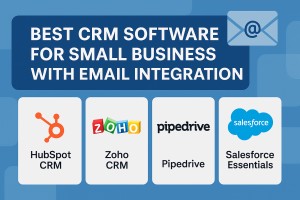Best CRM Software for Small Business with Email Integration: Top Picks & Guide Full Specification

Category: News
-
Sub Category: BANGLADESH
Best CRM Software for Small Business with Email Integration: Top Picks & Guide
By bringing all your customer data and emails into one place, CRM software helps you streamline communication, automate marketing tasks, and manage your sales pipeline more effectively. Whether you’re a startup or an established small business, the right CRM can save time, improve customer engagement, and boost revenue.
What is a CRM with Email Integration?
A CRM system stores and organizes customer data—names, emails, purchase history, interactions, and more. When combined with email integration, it allows you to send, receive, and track emails directly inside your CRM dashboard.
This means:
-
No more switching between inbox and CRM.
-
Every customer conversation is automatically logged.
-
You can send personalized campaigns and automate follow-ups.
In short, it ensures your business never misses an opportunity to connect with customers.
Benefits of Using CRM with Email Integration for Small Businesses
1. Streamlined Communication
Instead of digging through emails, all interactions are linked to customer records. This saves time and keeps everyone on the same page.
2. Improved Customer Relationships
With email tracking, you can see when a client opens your message or clicks a link. This helps you send timely follow-ups and build stronger relationships.
3. Sales & Marketing Automation
From drip campaigns to automatic reminders, CRM + email integration lets you nurture leads without manual effort.
4. Better Collaboration
Your sales, marketing, and support teams can all access the same customer conversations, improving coordination.
Key Features to Look for in CRM with Email Integration
Not all CRM software is created equal. Here are must-have features for small businesses:
-
Contact Management – Store customer details in one place.
-
Email Tracking & Templates – See who opens your emails and use pre-built templates.
-
Automation – Send campaigns automatically and schedule follow-ups.
-
Reporting & Analytics – Track sales, leads, and email engagement.
-
Scalability – Ensure it can grow with your business without breaking the budget.
Top 10 Best CRM Software for Small Business with Email Integration
1. HubSpot CRM
One of the most popular free CRMs. It offers email tracking, automation, and a full suite of marketing tools. Perfect for startups and growing businesses.
2. Zoho CRM
Affordable and feature-rich, Zoho integrates with Gmail, Outlook, and Zoho Mail. Its AI-powered insights help small businesses make smarter decisions.
3. Salesforce Essentials
A lightweight version of the world’s #1 CRM. It’s designed for small businesses that need powerful customization and sales automation.
4. Pipedrive
Known for its visual sales pipeline and ease of use. Email sync makes communication with leads smooth and efficient.
5. Freshsales (Freshworks CRM)
Built with sales teams in mind, Freshsales offers advanced automation, email workflows, and AI-driven lead scoring.
6. Insightly
Best for businesses that need both CRM and project management. It has strong email templates and integrations with Google and Office 365.
7. Keap (Infusionsoft)
Designed for small businesses that want advanced automation. Great for eCommerce and service providers who rely on email campaigns.
8. Agile CRM
Affordable and beginner-friendly, with a free plan for up to 10 users. Includes marketing automation and email campaigns.
9. Nutshell CRM
Simple and straightforward, Nutshell offers email sync, sales automation, and intuitive workflows that don’t overwhelm small teams.
10. Copper CRM
Built for Google Workspace users, Copper integrates deeply with Gmail and Google Calendar. Ideal if your business relies heavily on Google tools.
How to Choose the Right CRM for Your Business
Choosing the right CRM doesn’t have to be overwhelming. Follow these steps:
-
Define your needs – Do you need strong sales pipelines, marketing automation, or customer support tools?
-
Compare pricing – Start small with free or affordable plans and upgrade as your business grows.
-
Check integrations – Make sure it works with Gmail, Outlook, or other tools you use.
-
Test ease of use – Pick a CRM your team will actually enjoy using.
Common Mistakes to Avoid When Selecting a CRM
-
Picking a CRM only because it’s the cheapest.
-
Overlooking whether it integrates with your email system.
-
Choosing a system too complex for your team.
-
Ignoring customer support and onboarding options.
Real-Life Examples
-
A boutique marketing agency increased lead conversions by 40% after switching to HubSpot CRM with automated email campaigns.
-
A retail shop used Zoho CRM to manage customer loyalty emails, boosting repeat purchases by 25%.
FAQs on Best CRM Software for Small Business with Email Integration
Q1: What is the cheapest CRM with email integration?
Agile CRM offers a free plan with email features for up to 10 users.
Q2: Can CRMs integrate with Gmail and Outlook?
Yes, most CRMs like HubSpot, Pipedrive, and Zoho connect seamlessly with both.
Q3: Which CRM is best for startups?
HubSpot CRM is ideal for startups thanks to its free plan and scalability.
Q4: Do all CRMs include email automation?
Not all. Some offer basic integration, while advanced automation usually requires paid plans.
Q5: How secure is customer data in CRMs?
Trusted CRMs comply with security standards like GDPR and use strong encryption.
Q6: What is the easiest CRM for small teams?
Pipedrive and Copper CRM are known for their simple, intuitive interfaces.
Conclusion: Choosing the Best CRM for Growth
The best CRM software for small business with email integration depends on your needs and budget. If you want a free, easy-to-use option, HubSpot CRM is a great start. For affordability, Zoho CRM stands out, while Copper CRM is unbeatable for Google Workspace users.
By investing in the right CRM, you’ll save time, improve communication, and build stronger customer relationships—all of which fuel long-term business growth.